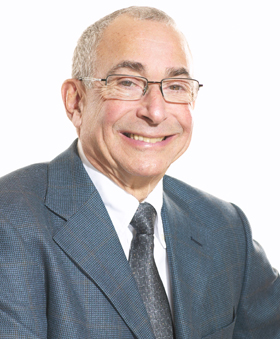Dr. Goldstein honoured with lifetime achievement award

By James Wysotski

Dr. Marc Goldstein
Dr. Marc Goldstein, a nephrologist in the Diabetes Comprehensive Care Program, was honoured by the Kidney Foundation of Canada at a gala on Oct. 19 for a lifetime of achievements with the George deVeber Award for Distinguished Service.
The award, named for the late Dr. George deVeber, founder of The Kidney Foundation of Ontario, recognizes an exemplary commitment to compassionate patient care and critical research advances.
“It’s humbling and flattering to be recognized by an organization such as the Kidney Foundation,” said Dr. Goldstein. “They do remarkable work to support kidney disease research and to help patients suffering from the disease. It is quite an honour.”
After getting his medical degree at McGill University and doing his residency at the Royal Victoria Hospital in Montreal, Dr. Goldstein completed a fellowship at the New England Medical Centre in Boston before joining St. Michael’s Hospital in 1971. Named medical director of the Hemodialysis Program in 1985, he focused his research on minimizing the impact of dialysis. In 1987, Dr. Goldstein helped develop the Percent Reduction of Urea method of quantifying the effectiveness of hemodialysis therapy that is still used throughout North America today.
“Dr. Goldstein is regarded as the father of the Diabetes Comprehensive Care Program and is truly a remarkable leader,” said Jonathan Fetros, program director of the Diabetes Comprehensive Care Program. “He’s played an integral role in positioning this program as a leader in high quality, patient-centered renal services.”
In 2004, Dr. Goldstein helped develop the St. Michael’s In-Centre Nocturnal Hemodialysis Program, where patients receive dialysis overnight while sleeping at the hospital. He said it led to “remarkable improvements” in both laboratory tests and how patients felt. It was the first program of its kind in Canada, and similar programs are now widespread across Canada and the United States.
“We can do a lot for patients, even when they feel quite ill,” said Dr. Goldstein. “In many cases we can return them to a relatively normal way of life with either dialysis or a transplant.
That certainly is very rewarding.”
A compassionate caregiver, Dr. Goldstein said he motivates patients by empowering them to take part in their treatment. He said patients were more compliant with their therapies when they’re not “passive bystanders,” so he and his staff encouraged patients to ask questions and perform self-care such as monitoring their blood pressure at home.
“I have never seen a physician as dedicated to his patient’s welfare as Dr. Goldstein,” said Dr. Ramesh Prasad, director of the Renal Transplant Program. “He knows his patients thoroughly and is always prepared to advocate on their behalf with other physicians so they can receive the best care possible.”
In 1995, the Kidney Foundation gave Dr. Goldstein the Medical Award for his dedication to academic nephrology. In addition to numerous academic appointments at the University of Toronto and abroad, Dr. Goldstein has worked with the foundation to enhance its medical programs since joining its National Medical Advisory Board in 1983, including the development of its fellowship program which allowed him to award research grants across Canada.
About St. Michael’s Hospital
St. Michael’s Hospital provides compassionate care to all who enter its doors. The hospital also provides outstanding medical education to future health care professionals in more than 29 academic disciplines. Critical care and trauma, heart disease, neurosurgery, diabetes, cancer care, care of the homeless and global health are among the Hospital’s recognized areas of expertise. Through the Keenan Research Centre and the Li Ka Shing International Healthcare Education Centre, which make up the Li Ka Shing Knowledge Institute, research and education at St. Michael’s Hospital are recognized and make an impact around the world. Founded in 1892, the hospital is fully affiliated with the University of Toronto.
